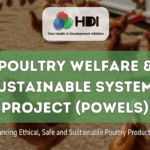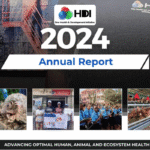Contributors – Drs Kikiope Oluwarore and Edward Olajide
Toxoplasmosis is a zoonotic disease of felids, especially domestic and wild cats. It is caused by a protozoan parasite called Toxoplasma gondii (T. gondii) which can be found worldwide. Cats are regarded as the definitive host, which means that they are the host where sexual reproduction of the parasite takes place. Other warm-blooded mammals such as rodents, sheep, goat, pig, marine animals may serve as intermediate host.
Cats can be infected with the parasite when they consume meat or prey animals like rodents that are already infested with T. gondii cysts or by coming in contact with the feces of an infected cat. After the cat has been infected through ingestion, the parasite multiplies in the intestines until immature eggs called oocysts are repeatedly shed in the cat’s feces for about two weeks. Outside the cat, the oocysts become sporulated (meaning they become infectious) in favorable atmospheric conditions and this usually happens within a week. The oocysts can remain viable in the atmosphere in this sporulated state for several weeks and any human will be at risk of infection.
Humans can be infected in several ways. These include coming in contact with the feces of an infected cat, exposure to infected garden soils or cat litter boxes, drinking of contaminated food items and drinking water, handling of contaminated meat, consumption of undercooked meat, and/or consumption of unwashed vegetables and fruits.
Risk Factors
Pregnant women are particularly at risk of contracting Toxoplasmosis. According to Bamba et al (2017), the risk of women getting infected with T. gondii during pregnancy is as high as 80% especially if there is a domestic cat in their home and environment, or if they constantly come in contact with wild cats or gardening soils. Toxoplasmosis infection during pregnancy is dangerous as it can cause miscarriage, stillbirth, or damage to the baby’s brain and other organs, particularly the eyes. Though most babies born with toxoplasmosis who survive have no obvious damage at birth, they usually develop the symptoms during childhood or even adulthood. Other persons with an increased risk factor of getting infected with toxoplasmosis include people with compromised immunity, existing malignancies, people undergoing anti-tumor therapy, and people with acquired immune deficiency syndrome (AIDS)
Toxoplasmosis in Nigeria
Ohiolei and Isaac (2016) provide a comprehensive review of the epidemiology and seroprevalence of Toxoplasmosis in Nigeria from 1950 to 2016. They state that the seroprevalence of human toxoplasmosis in Nigeria is estimated at 32% in the North-West, 22% in North-East,24% in North-Central, and 37% in the South-West geo-political zones respectively, while there is little to no data on Toxoplasmosis for the South-South and South-East. In all the zones, it is reported that the impact of the diseases has been greater on the health of pregnant women and people living with HIV who have been infected with Toxoplasmosis. This is concurrent with the earlier explanations of Toxoplasmosis risk-factors.
Signs and Symptoms
In cats, signs and symptoms observed may include fever, vomiting, diarrhea, lethargy, cough, weight loss, jaundice, pneumonia, liver damage, lameness, neurologic problems, abortion and stillbirth for pregnant cats, and in extreme cases, death. In humans, the symptoms of toxoplasmosis often overlap and are similar to other infectious diseases like malaria, influenza, and other viral diseases. Therefore, it often goes undiagnosed and is under-reported in many cases. However, according to Ohiolei and Isaac (2016), an accompanying symptom like cervical lymphadenopathy often points to an infection with T. gondii. Other key signs of toxoplasmosis in humans include fever, neurologic problems with abortion and stillbirth in infected pregnant individuals.
Prevention and Control
Prevention and control measures must be strictly adhered to by people who are considered most-at-risk of getting infected with Toxoplasmosis. As mentioned earlier, these include pregnant people who keep domestic cats or have constant contact with wild or domestic cats, people with compromised immune systems and people living with HIV. These prevention measures include the following;
- Ensure domestic cats are kept indoors and prevent them from predating and scavenging.
- Ensure cat litter boxes are emptied daily.
- Do not be feed cats with raw meat; instead ensure that the meat is cooked properly.
- Always cover sandboxes or garden containers to prevent cats from defecating into it.
- Practice safe hygienic measures always by wearing disposable gloves and washing hands thoroughly after handling a cat litter tray or gardening (This is especially for pregnant women and immune-compromised individuals)
- Thoroughly wash vegetables and fruits before consumption
At the moment, there is no vaccine is available against Toxoplasmosis. Therefore, if you, your animal or anyone/animal you know is showing symptoms of the disease, ensure you contact our Animal Care Hotline/WhatsApp on 08055993123 to receive quality professional advice on the health of your animal and referral to the nearest animal care center closest to you. You are also advised to see a human health provider for confirmatory diagnosis and treatment.
Additional Sources: Pets MD and Cat Care
Are you an animal health service provider in Nigeria? Get enlisted on the OHDI Directory for Animal Health and Welfare Services.
Having issues with your pet, and livestock farm or need quality information and referrals to animal health services within your area? You can send a WhatsApp message to 08055993123 to get all the information you need. It’s FREE











